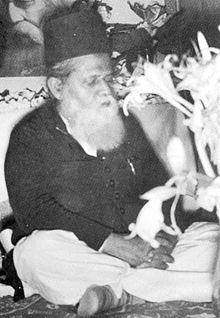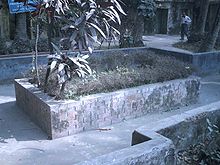
Muhammad Shahidullah
Encyclopedia

Bengal
Bengal is a historical and geographical region in the northeast region of the Indian Subcontinent at the apex of the Bay of Bengal. Today, it is mainly divided between the sovereign land of People's Republic of Bangladesh and the Indian state of West Bengal, although some regions of the previous...
i educationist, writer philologist and linguist.A dormitory in University of Dhaka is named after him (Shahidullah Hall).
Early life
He was born in the village Peyara, 24 Pargana, West BengalWest Bengal
West Bengal is a state in the eastern region of India and is the nation's fourth-most populous. It is also the seventh-most populous sub-national entity in the world, with over 91 million inhabitants. A major agricultural producer, West Bengal is the sixth-largest contributor to India's GDP...
(now in India
India
India , officially the Republic of India , is a country in South Asia. It is the seventh-largest country by geographical area, the second-most populous country with over 1.2 billion people, and the most populous democracy in the world...
). His father Mafizuddin Ahmed was a warden of a shrine.
Education
Muhammad Shaidullah passed his school finals (known as Entrance examination at that time) in 1904 from Howrah Zila School. In 1906 he passed the FA exam (equivalent to HSCHigher Secondary (School) Certificate
The Higher Secondary Certificate, also known as HSC, is a public examination taken by students in Bangladesh, Pakistan and in the states of Gujarat, Tamil Nadu, Andhra Pradesh, Punjab, Maharashtra and Goa in India after successfully completing at least twelve years of schooling, that is two years...
) from Presidency College
Presidency College, Kolkata
Presidency University, Kolkata, formerly Hindu College and Presidency College, is a unitary, state aided university, located in Kolkata, West Bengal. and one of the premier institutes of learning of liberal arts and sciences in India. In 2002 it was ranked number one by the weekly news magazine...
, Kolkata
Kolkata
Kolkata , formerly known as Calcutta, is the capital of the Indian state of West Bengal. Located on the east bank of the Hooghly River, it was the commercial capital of East India...
. He received the Bachelor of Arts
Bachelor of Arts
A Bachelor of Arts , from the Latin artium baccalaureus, is a bachelor's degree awarded for an undergraduate course or program in either the liberal arts, the sciences, or both...
degree with Honors in Sanskrit
Sanskrit
Sanskrit , is a historical Indo-Aryan language and the primary liturgical language of Hinduism, Jainism and Buddhism.Buddhism: besides Pali, see Buddhist Hybrid Sanskrit Today, it is listed as one of the 22 scheduled languages of India and is an official language of the state of Uttarakhand...
in 1910 from City College, Kolkata
City College, Kolkata
City College is a constituent undergraduate college of the University of Calcutta. Established in 1881, it is one of the heritage institutions of Calcutta which played a prominent social role in the wake of the Bengal Renaissance of the nineteenth century. The college is located at 102/1, Raja...
, and Master of Arts
Master of Arts (postgraduate)
A Master of Arts from the Latin Magister Artium, is a type of Master's degree awarded by universities in many countries. The M.A. is usually contrasted with the M.S. or M.Sc. degrees...
in 1912 in Comparative Philology from the University of Calcutta
University of Calcutta
The University of Calcutta is a public university located in the city of Kolkata , India, founded on 24 January 1857...
. He also received a PhD
PHD
PHD may refer to:*Ph.D., a doctorate of philosophy*Ph.D. , a 1980s British group*PHD finger, a protein sequence*PHD Mountain Software, an outdoor clothing and equipment company*PhD Docbook renderer, an XML renderer...
from Sorbonne university.
Early teaching and research career
Shahidullah's teaching career started in Jessore Zilla SchoolJessore Zilla School
Jessore Zilla School, established in 1838, is one of the oldest schools in Jessore District, southwest Bangladesh. In 2000 it had some 1,450 students, running in two shifts .History=...
where he taught between 1908 and 1909. He also worked as the headmaster of Sitakunda
Sitakunda Upazila
Sitakunda is an upazila, or administrative unit, in the Chittagong District of Bangladesh. It includes one urban settlement, the Sitakunda Town, and 10 unions, the lowest of administrative units in Bangladesh. It is one of the 14 upazilas, the second tier of administrative units, of the Chittagong...
High School, Chittagong
Chittagong
Chittagong ) is a city in southeastern Bangladesh and the capital of an eponymous district and division. Built on the banks of the Karnaphuli River, the city is home to Bangladesh's busiest seaport and has a population of over 4.5 million, making it the second largest city in the country.A trading...
between 1914 and 1915. However, he returned to research and worked as Sharatchandra Lahiri Research Fellow (1919-21) under the supervision of Prof. Dinesh Chandra Sen
Dinesh Chandra Sen
Rai Bahadur Dinesh Chandra Sen was an Indian writer in Bengali, educationist and researcher of Bengali folklore...
at the University of Calcutta. Subsequently, Shahidullah joined the University of Dhaka
University of Dhaka
The University of Dhaka is the oldest university in Bangladesh. It is a multi-disciplinary research university and is among the top universities in the region. Established on July 21, 1921, as per the Government of India Act, 1920, it was modelled on the Universities in England and soon gained...
as a lecturer of Sanskrit and Bangla languages in 1921 . His years at the University of Dhaka constituted the most important period of his life. During his teaching and research career there, he explored the origins of the Bangla language. In 1925, he was able to show that Bangla originated from Gaudi or Magadhan Prakrit (or derivative of Sanskrit).
To pursue his doctoral studies, Muhammad Shahidullah went to France
France
The French Republic , The French Republic , The French Republic , (commonly known as France , is a unitary semi-presidential republic in Western Europe with several overseas territories and islands located on other continents and in the Indian, Pacific, and Atlantic oceans. Metropolitan France...
and Germany
Germany
Germany , officially the Federal Republic of Germany , is a federal parliamentary republic in Europe. The country consists of 16 states while the capital and largest city is Berlin. Germany covers an area of 357,021 km2 and has a largely temperate seasonal climate...
in 1926. He learnt Vedic Sanskrit
Vedic Sanskrit
Vedic Sanskrit is an old Indo-Aryan language. It is an archaic form of Sanskrit, an early descendant of Proto-Indo-Iranian. It is closely related to Avestan, the oldest preserved Iranian language...
, Buddhist Sanskrit, Comparative Philology, and Tibetan and ancient Persian language
Persian language
Persian is an Iranian language within the Indo-Iranian branch of the Indo-European languages. It is primarily spoken in Iran, Afghanistan, Tajikistan and countries which historically came under Persian influence...
at University of Paris
University of Paris
The University of Paris was a university located in Paris, France and one of the earliest to be established in Europe. It was founded in the mid 12th century, and officially recognized as a university probably between 1160 and 1250...
, and ancient Khotni, ancient Vedic Sanskrit and Prakrt at Freiburg University in Germany. He received his doctorate from the Sorbonne
Sorbonne
The Sorbonne is an edifice of the Latin Quarter, in Paris, France, which has been the historical house of the former University of Paris...
in Paris in 1928 for his research on the distiches of the Charyapada
Charyapada
The Charyapada is a collection of 8th-12th century Vajrayana Buddhist caryagiti, or mystical poems from the tantric tradition in eastern India. Being caryagiti , the Charyapada were intended to be sung. These songs of realization were spontaneously composed verses that expressed a practitioner's...
, the earliest extant specimens of Bangla language.
Dr. Shahidullah was the first Indian Muslim to receive the doctorate degree. He also received a diploma for his fundamental research in phonetics from the University of Paris the same year. After completing his doctorate, he returned home and started teaching. When the Sanskrit and Bangla Department was split into two separate departments, he became head of the Bangla Department in 1937 and retired from this position in 1944.
He became principal of Bogra
Bogra
Bogra is a town, and one of the oldest towns in northern Bangladesh. It is a centre of commerce and trade within the Bogra District and located under the Rajshahi Division. Bogra is sometimes described as the nerve centre of Northern Bangladesh. Amongst many notable activities, it has been hosting...
Govt. Azizul Haque College after retirement. He then rejoined the Bangla Department of the University of Dhaka as a supernumerary teacher and taught there for six years as departmental head and dean of the Faculty of Arts and International Relation Department (as teacher of French language
French language
French is a Romance language spoken as a first language in France, the Romandy region in Switzerland, Wallonia and Brussels in Belgium, Monaco, the regions of Quebec and Acadia in Canada, and by various communities elsewhere. Second-language speakers of French are distributed throughout many parts...
) (1953-55). He also worked as head of the Bangla and Sanskrit Department of the University of Rajshahi from 1955-58.
Important works

He also took active interest in Bangla folk literature. Apart from research, he wrote for children. He also translated and edited a number of books. Noteworthy among his books are Sindabad Saodagarer Galpa (The stories of the merchant Sindbad, 1922), Bhasa O Sahitya (Language and literature, essays, 1931), Bangala Byakaran (Bangla grammar, 1936), Diwan-i-Hafiz (Poems of Hafiz, translation, 1938), Shikwah O Jawab-i-Shikwah (Questions and their answers, translation from Iqbal, 1942), Rubaiyat-i-Omar Khaiyam
Rubaiyat of Omar Khayyam
The Rubáiyát of Omar Khayyám is the title that Edward FitzGerald gave to his translation of a selection of poems, originally written in Persian and of which there are about a thousand, attributed to Omar Khayyám , a Persian poet, mathematician and astronomer...
(Quatrains of Omar Khayyam, translation, 1942), Essays on Islam (1945), Amader Samasya (Our problems, essays, 1949), Padmavati (Volume I ed, 1950), Bangla Sahityer Katha (History of Bangla literature, Volume I in 1953, Volume II in 1965), Vidyapati Shatak (Collection of Vidyapati's songs, text analysis, 1954), Bangla Adab Ki Tarikh (History of Bangla literature, essays, in Urdu, 1957), Bangla Sahityer Itihas (History of Bangla literature, 1957), Bangala Bhasar Itibrtta (History of Bangla language', 1959), Qur'an Sharif (The Qur'an, 1963), Amarkabya (Unforgettable poetical works, 1963), Sekaler Rupkatha (Fairy tales of ancient time, 1965), etc. The dictionary of regional dialects published under his editorship is another noteworthy work associated with him. He edited Traditional Culture in East Pakistan
East Pakistan
East Pakistan was a provincial state of Pakistan established in 14 August 1947. The provincial state existed until its declaration of independence on 26 March 1971 as the independent nation of Bangladesh. Pakistan recognized the new nation on 16 December 1971. East Pakistan was created from Bengal...
in collaboration with Muhammad Abdul Hai. His Buddhist Mystic Songs (1960) is a translation and an edited version of the Charyapada
Charyapada
The Charyapada is a collection of 8th-12th century Vajrayana Buddhist caryagiti, or mystical poems from the tantric tradition in eastern India. Being caryagiti , the Charyapada were intended to be sung. These songs of realization were spontaneously composed verses that expressed a practitioner's...
. He was the first to note that Charyapada is completely written in Bangla and to highlight the religious philosophy of the work. He was buried in 'Shahidullah Hall' in the University of Dhaka.
Dr. Shahidullah is also credited with formulating the rules for the reformed Bangla Calendar.

